Since I fitted the new “8kW” diesel heater to the camping power trolley, it has occurred to me that there is a lot of energy in the exhaust gas stream that ordinarily would be wasted into the atmosphere. Since we’re all still on lockdown here in the UK, I figured it would be good to run an experiment to see if it was worth recovering this energy – in the form of heating water.
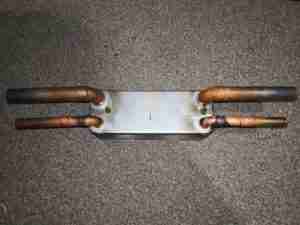
Some time ago, I stripped an old gas combi boiler, and recovered some parts – most important here the HDW plate heat exchanger. This large chunk of stainless steel is a stack of formed plates, brazed together, that usually would heat Domestic Hot Water. In this instance it’s being repurposed to transfer heat from exhaust gas to water.
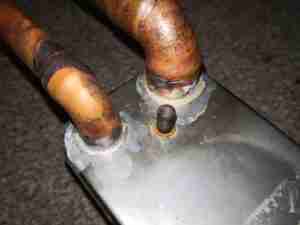
These heat exchangers are mounted in the boiler via a plate with O-Ring seals on, so they don’t really have fittings – just holes in the end plate. Solving this problem was simple – braze on some copper fittings with 55% silver brazing rod. The 22mm is the exhaust side, while the 15mm is the water side.
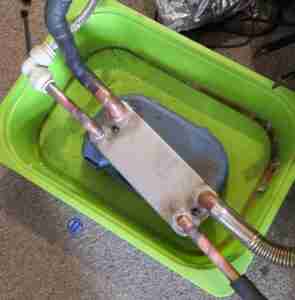
Cobbling together some random hose & fittings, along with a small water pump allowed me to run a first test. At this point there is no lagging at all on the exhaust system from the heater, so it’s going to shed a lot of exhaust heat into the air before it even gets to the heat exchanger. However I was able to get around 600W of heat into 15L of water, heating it up nicely. The heat exchanger is plumbed contra-flow here – exhaust comes in via the stainless tube on the bottom right, and water comes in through the speedfit elbow on the top left.
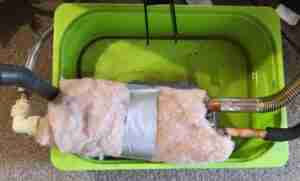
After the temperature of the water tank hit a plateau at around 45°C, I decided to insulate everything the best I could with what I currently have. I’ve wrapped the heat exchanger with some recycled PET insulation here, just to hold the heat inside. I’m not concerned about the exhaust outlet being in contact with the fluff – this system is so effective at pulling the heat out of the exhaust that the gas exiting the far end is totally cold!
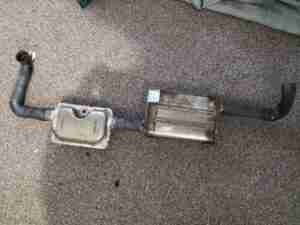
Now it was time to get the exhaust system under the trolley insulated. This is the system removed from the unit entirely. This is constructed from copper pipe, brazed onto standard silencers. Deadening the sound from the unit is important, as this gets used on campsites!
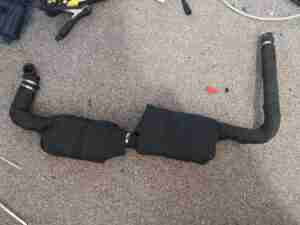
An hour & some itchiness later, the exhaust is completely covered in fibreglass insulation, secured in place with stainless steel ties.
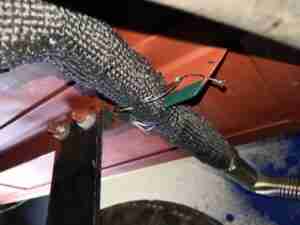
The exhaust originally passed through a close-fitting hole in the frame rail which would obviously not work now due to the thickness of the insulation layer, so this was modified with a grinder. Since there was now no support for this end of the exhaust, a pair of drilled holes & some stainless steel wire form a nice hanger!
With all this insulation in place (including around the tank & pump), the rig is now able to easily hit 65°C within a short time, so there has definitely been an improvement. At this point, it’s clear that waste heat recovery is worthwhile, so I’ll be building a proper rig to capture this energy for reuse!

Hi there,
Any news progress from the project :
With all this insulation in place (including around the tank & pump), the rig is now able to easily hit 65°C within a short time, so there has definitely been an improvement. At this point, it’s clear that waste heat recovery is worthwhile, so I’ll be building a proper rig to capture this energy for reuse!
Looks like a simple but effective way to capture exhaust heat into water.
Greetings,
Arjen
Hi. Any problems with condensate and/or soot in the exhaust after or in the heat exchanger?